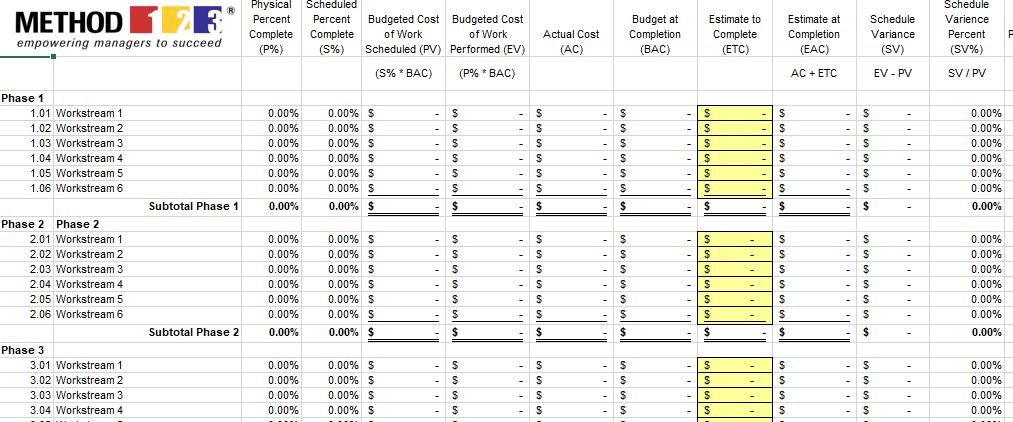Delivering Greater Value as a PMO
Every organization will have to deal with projects that are under-performing, over budget, behind schedule -- in a word troubled! We identify 2 very specific things that organizations need to do in response. The first is immediate and the later is a more systematic response to prevent projects in the future from becoming troubled.
1. Deal with Troubled Projects Head On
When a project gets in trouble, too often, the first tendency is to extend the deadline and spend more money on it in hopes of getting it finished. This is a bad idea, especially if the situation occurs late in the project's life cycle.

Ideally, early on, the PMO leader should develop a basic list of conditions that will trigger an investigation into whether a project is in trouble. Usually, a "consensus" on trouble inevitably will emerge, but it often occurs too late in the process.
The primary means of addressing troubled projects are:
Re-scope: Assess if there is value that can be derived from the project within the agreed-upon time frame of the project. We're not advocating just cutting scope and declaring victory here -- we recommend that you make the assessment and then evaluate the 'new project' as you would any new proposal and determine where it fits in the portfolio.
Reschedule: Determine if the timing of the initiative is simply incorrect. Some projects are in trouble because they are hampered by other dependencies in the organization and the timing is just not right for the project to proceed successfully. Resources can be better deployed elsewhere until the initiative is ready to start back up.
Restructure: The wrong people may be on or in charge of the project. Clearly, this is a delicate political issue to navigate in any organization but it is one that a PMO leader needs to have a stomach for.
Cancel: A highly underutilized option that I believe has a great effect. It requires honest and strong leadership. The skill of a PMO leader exercising this option is to pivot towards the value in redeploying organizational resources and bringing to an end a fruitless endeavor.
2. Build Project Management Teams that Have the Skills to Lead Projects and Not Simply Track them.
If PMO leaders really want to establish a value proposition of being able to help deliver projects with the right outcomes more quickly, then they need to ensure the project manager assigned to lead (not just track) the delivery effort has the right skills. Project Managers need to have a competency in these 3 areas:
Scope Management: Truly managing the scope of a project takes project managers who actually understand at least something about what they are delivering.
Time Management: Failure to proactively manage the schedule to deliver the product of the project by the deadline is a failure to show competency.
Budget Management: Determine when and if adding more money to a project can effectively deliver the value early, or at least on time. Determine where the real financial risks are, and either mitigate or at least communicate, them early enough so that management can influence the outcomes.
Ask Method123
Today’s question comes from S. Cope:
We’re starting a project to replace our existing help desk application. There are a lot of unknowns that are making it difficult to provide details to management at this point because a lot will depend on the approach we take (eg. upgrade existing, move to a SaaS product, buy a new on-premise app). How should we report this out so we cover ourselves against the uncertainty and risk?
The challenge with this project is that it really is 2 projects in 1. The first phase of it is to determine the product and approach that you want to move forward with. I would most likely carve this out as a separate analysis project. By doing this as a separate evaluation project you can decouple it from all the uncertainty until you know exactly what technology solution you intend to implement. Once the analysis project is done you can move into an implementation project.
Got a question you would like answered or a problem you need advice on? Drop us a line using the button below:
Got a second? Like what you’re reading? Click the button below and subscribe to the newsletter you’re reading now. Did we mention, you get free stuff too?
Career Corner
Last month we noted that many companies acknowledge the distinction and importance of the transformational side of their business as opposed to their daily operations. To lead their companies through these transformations, organizations require specific skills ideally found in good project managers.
While there are many lists published outlining the skills that executives and managers seek when filling these positions, we’ll focus a bit more on the characteristics or behaviors of these skills.
“Leadership” is often the skill that comes at the head of these lists - but, how specifically do good project managers exhibit these leadership skills? It often seems that leading, inspiring, and motivating are just too vague to describe leadership. However, when we asked hiring managers to identify some key behaviors that they liked to see in their project managers we obtained some more useful descriptions.
Transparency surfaced quite frequently as a highly regarded behavior. Many described it as the ability to deliver reality regardless of whether or not it was good news or bad news. They emphasized the ability to be unafraid to call out either their own issues or issues with the project. Too often, it was felt, that project managers had shielded management from the bad news until it was too late to take corrective action. Closely related to transparency was honesty. Clearly this is a behavior everyone would value but within the realm of project management, they cited honesty in the context of setting expectations. Many had the experience of receiving over-optimistic projections only to be handed disappointing ‘new projections’ later on.
Thirdly, taking ownership ranked right at the top of the desirable behaviors list. Having a take-charge project manager that has a strong sense of ownership and accountability was highly regarded. There was a greater emphasis on the ability to ‘make something happen’ and ‘own it’ rather than simply reporting what others were doing or not doing.
In our next segment of the Career Corner, we’ll take a look at the interview process and how to demonstrate these behaviors.
New Product Beta Group
Method123 is working on a new software application that we are targeting for release Q1 2021. Want to help us build it by being in the beta group? Join the group by clicking the button below and filling out some details.
Webinar Series
Risk Assessment
For project managers, risk management is a way of life. Method123 has you covered with our Project Risk Assessment Tool.

Budget Management

Share the Wealth
Method123’s Affiliate program enables members to spread the word about our best selling PM Template Kit and MPMM Professional methodology software — and get paid for it!

Snag 20% commission on any sales using the unique links provided in your own Affiliate Dashboard. Sell of Facebook, Instagram, Twitter, Reddit, LinkedIn, email, website, or blog — basically, anywhere you can post a link.

